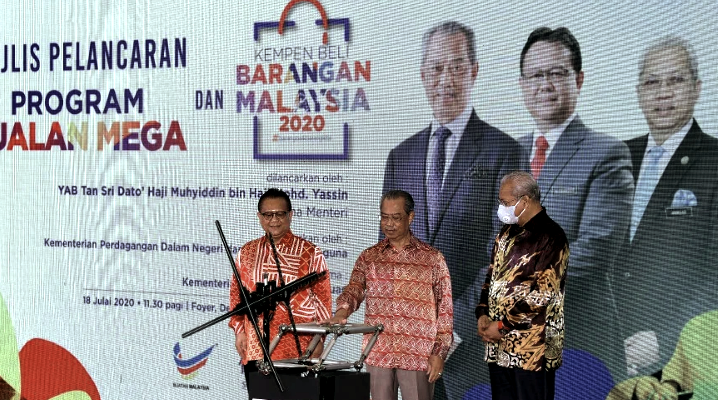Sin Chew Daily
Prime minister Tan Sri Muhyiddin Yassin recently urged Malaysians to buy local products in hope of stimulating the national economy.
Many countries around the world have resorted to the drastic measures of imposing nationwide lockdowns, home quarantines and halting all commercial and manufacturing activities in a bid to stop the spread of the dreadful coronavirus. As a consequence, the global economy is facing a severe contraction, prompting the IMF to revise downward this year's global growth outlook to minus 4.9%. No countries can be spared from the scourge!
With commercial activities worldwide brought to knees, export-oriented businesses will be adversely affected while domestic market recovery is only possible if the people are willing to spend.
In view of this, the PM has come up with the "buy Malaysian" policy to boost local businesses while cutting our dependence on imports to stem capital outflow.
This initiative encompasses all economic sectors, from agriculture, manufacturing, commercial to services. It is seen as an extraordinary means to weather the current challenging time.
In short, if we can eat locally grown bananas and watermelons, we should eat less of Japanese apples and cherries (agriculture), or buy a Perodua instead of an imported car (manufacturing), or have a Cuti-Cuti Malaysia instead of an oversea trip (services). But what about smartphones, iPad, computers and other non-Malaysian products, not to mention others which many are unable to tell whether they are locally made or imported?
Muhyiddin said the Malaysian Investment Development Authority (MIDA) had set up an online platform with over 4,000 locally made products as priority businesses for government procurement. Additionally, the PM has also explicitly instructed local businesses such as retail shops and supermarkets to clearly label local products, while major e-commerce platforms are urged to set up dedicated micro sites for Malaysian products for the convenience of online shoppers.
Encouraging Malaysians to buy local products is a feasible policy but there are two basic requirements that need to be met. Firstly, Malaysians must be patriotic to buy local products, and secondly, the quality of local products must be reasonably good.
The top ten best-selling cars in Japan last year were all Japanese models. And in South Korea, Samsung smartphones commanded nearly 70% of the home market share. In addition to stronger patriotism among the people of these two countries, most importantly their products are also of superior quality!
Meanwhile in Taiwan, the government has introduced the stimulus voucher program to encourage local residents to spend more in order to stimulate the pandemic-stricken economy. Any citizen, rich or poor, can purchase the NT$3,000 shopping vouchers from the government for only NT$1,000 cash by producing their identity cards. Supposing 10 million Taiwanese purchase the vouchers, it will mean NT30 billion cash flow released into the local market!
Such a model can actually be adopted in Malaysia too. Asking Malaysians to buy local products will remain just a slogan if we do not have any effective solutions to encourage people to spend. Perhaps we can introduce something like RM1,500 "Buy Malaysian Vouchers" for RM500 to boost spending (only on local products). If 20 million Malaysians take part in this program, we will have additional RM30 billion in the market. This is far more effective than distributing cash (which is often deposited in the bank) to kickstart the economy.
Malaysians are generally patriotic and are willing to buy local products instead of more expensive imports provided that the government provides some incentives.
US President John F. Kennedy famously said, "Ask not what your country can do for you, ask what you can do for your country."
Even without any "Buy Malaysian stimulus voucher" program, Malaysians should still do their best to buy locally made products to help the nation sail past the difficult times.

ADVERTISEMENT
ADVERTISEMENT


































